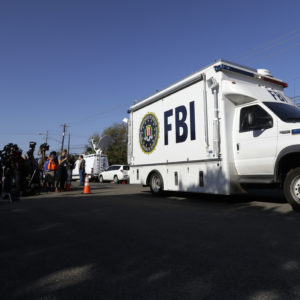Life changed for Muhammad Tanvir when FBI agents showed up at his work in 2007 and started asking questions.
They did not suspect him of wrongdoing, but instead wanted to recruit him as an informant against his Muslim community in Queens.
Tanvir told the agents that if he knew of any criminal activities, he would report them, but that spying would be incompatible with his religious beliefs. In response the FBI launched a six-year campaign of harassment against Tanvir, a permanent U.S. resident who now runs a tire and auto repair shop in North Carolina.
Agents followed him, photographed him, called him at home, embarrassed him in front of his employers and confiscated his passport.
They also placed him on the No-Fly List, which meant he could not visit his wife or family in Pakistan. Tanvir also had to quit his job as a long-haul trucker, which sometimes required him to fly home after finishing deliveries.
Other Muslims experienced similar treatment when they resisted FBI recruitment efforts.
Agents made the choice clear: Comply with their demands or forfeit the right to travel and live in peace. People of all faiths — even those with no religious affiliation — should be alarmed when government agents violate the First Amendment guarantees of free speech and association.
Despite the blatant retaliation, participating agents claim immunity from lawsuits for money damages because they removed Tanvir and other innocent people from the No-Fly List before litigation could proceed. In other words the agents argue that Tanvir is entitled to nothing, and the FBI should pay no price for retaliating against someone they acknowledge was honest and hard-working.
The Southern District of New York agreed with the twisted logic and dismissed the case in 2016, but the 2nd U.S. Circuit Court of Appeals reversed the decision. Rather than relent and allow a trial to commence, the government successfully petitioned the U.S. Supreme Court to consider whether Tanvir had a right to sue the government in the first place.
Oral arguments were scheduled for Oct. 6, more than 13 years after the saga began.
Additional hurdles would remain for Tanvir, even if he scores a high court victory. For starters, he would have to go back to the lower courts and deal with something called “qualified immunity.”
That legal doctrine, invented by the Supreme Court in 1982, shields police and other government employees from personal responsibility for their actions unless their accusers can point to a previous case that clearly establishes that the misconduct was unconstitutional.
Just in 2019 alone, courts used qualified immunity to excuse the destruction of an innocent woman’s home with gas grenades, the theft of $225,000 by police officers, the warrantless search of a doctor’s medical records, the punishment of a high school cheerleader for off-campus speech, the solitary pretrial confinement of a 14-year-old child, and the torture of a prison inmate left alone for six days in a cold cell without a bed or toilet.
Government officials have multiple tricks to avoid accountability, and people like Tanvir must overcome them one at a time. Sometimes, this means going all the way to the Supreme Court just to win the right to proceed to the next round.
A friend-of-the-court brief from the nonprofit Institute for Justice cuts through all the legal maneuvering and makes a simple argument: If government agents abuse your rights, they have to pay you back. Otherwise, constitutional guarantees have no meaning. A law without a penalty for violation is just a suggestion.
Monetary damages are not only appropriate, they are one of the primary mechanisms by which individuals hold officials accountable to the Constitution. This was always the pattern in the United States. Judges considered the facts, determined whether a violation had occurred, and set the right level of relief. The focus was on making people whole.
Even then, public employees have a built-in advantage because they do not bear their own litigation costs. Government attorneys almost always represent them. If found liable in the end, public employees typically do not pay out of their own pockets.
As shown in a study by University of California, Los Angeles professor Joanna C. Schwartz, police officers contribute just 0.02 percent toward damages entered against them.
Tanvir does not have that kind of cover. He must answer for his own actions, just like other private individuals. The same standard should apply to public employees. The Constitution promises equal justice, not a two-tier system that shields some but not others.

